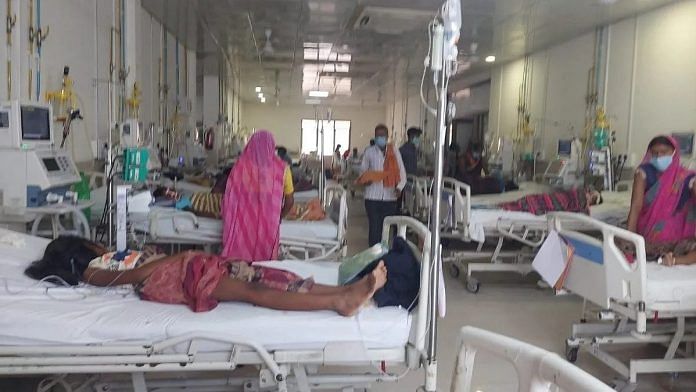
Thank you dear subscribers, we are overwhelmed with your response.
Your Turn is a unique section from ThePrint featuring points of view from its subscribers. If you are a subscriber, have a point of view, please send it to us. If not, do subscribe here: https://theprint.in/
I received an email from Print the other day, giving me an opportunity to write openly about any subject that concerned me to be published on The Print.
I was excited about the opportunity and thought I should perhaps highlight a neglected issue that has bearing on most of our lives. Like most of us, I also have an ageing parent to care for.
In 2011, the very day the country was celebrating India’s world cup victory, my father breathed his last after suffering his second heart attack. Like most of our parents, he also did not bother with health insurance.
I was fresh out of college at the time of his first heart attack, I had saved some money through part time work, money earmarked for starting my own business. I had plans for what you would today call a startup. I ended up spending that money on my father’s treatment and become the sole bread winner for the family, with an unmarried sister. The typical Bollywood cliché of my personal story I am certain is not lost on anybody here.
Having learnt my lesson the hard way, I had decided not to make the same mistake with my mother. I eventually bought a Rs. 3 Lac Health Insurance Cover for my mother in 2014. My mother was already 62 years old, suffering from Hypertension, Arthritis and Thyroid conditions. The premium was Rs. 12535/- with a copay condition. I wondered if I had two ageing parents and a family of my own to care for, how would I have managed such an expense.
So began my saga with Health Insurance. These days, we are all advised to buy health insurance early to avoid high premiums and getting preexisting conditions covered. However, nobody tells you that your health insurance premiums are not linked only to your health status and age, they multiply suddenly through what is called the Medical Inflation.
The insurance companies figure out how much the cost of treatment has escalated for the year, and they get the IRDA to approve hikes in insurance premiums. Mind you, the inflation only hits the premiums, your sum assured remains virtually unchanged.
Since 2019, The Medical Inflation bug also hit my premiums:
| Year Of Payment of Premium | Premium Amount | % Increase from Previous Year |
| 2014 | 12535.00 | |
| 2015 | 12535.00 | 0 |
| 2016 | 12744.00 | 1.66 % |
| 2017 | 12829.00 | 0.66 % |
| 2018 | 13164.00 | 2.61 % |
| 2019 | 18311.00 | 40.00 % |
| 2020 | 18311.00 | 0.00 % |
| 2021 | 23360.00 | 27.57 % |
| 2022 | 29531.00 (5 Lac Upgrade) | 26.41 % |
| 2023 | 35336.00 | 19.65 % |
The Insurance company has managed to increase the premium by 20%+ every alternate year since 2019, and the IRDA has been a willing partner in this endeavor. I was concerned about the sum assured being too low, so in 2022, I increased it to 5 Lacs paying an even higher premium.
Whenever an insurance company decides to increase their premium, they get it approved from IRDA. The process involves presenting relevant data to IRDA, publishing the intent in newspapers for the public to record objections, and informing the policyholders about the said change. It all seems very fair. However, I do not recall reading about an insurance company’s intent to raise premiums and asking for feedback, I am certain its there somewhere. As a policy holder as well, I do not get any communication regarding increase in premium, they sure do call several times when renewal is due.
The term Medical Inflation is also very fascinating, it has no bearing on your sum assured, only the premium. One would assume the sum assured also be affected by Medical Inflation, and IRDA should ask the companies to increase the sum assured in line with the increased premiums, unfortunately that part of the reality has not dawned on any of the authorities concerned.
Insurance companies argue that they provide cumulative bonus for claim free years, however its nowhere near the increased premiums, and its conditional to you not claiming in the given year. Subsequent Premiums on the other hand go up considerably if you file a claim.
Insurance companies face challenges. Fraudulent claims, increased management costs, and most importantly, the need to show 20% CAGR growth to shareholders, however, they do earn by investing the premiums collected and through the growth that our massively underpenetrated insurance sector offers.
Mindless increase in premiums is a certain way of killing the hen that lays the golden egg. People discontinue their health insurance midway, especially for elderly people, leaving them vulnerable and India perpetually underinsured. I hope the powers that be will find some time to reflect on the issue. And for ordinary folks like me, do not get swayed by initial low premium offers, please do factor in the subsequent explosion in premiums.
These pieces are being published as they have been received – they have not been edited/fact-checked by ThePrint.


COMMENTS